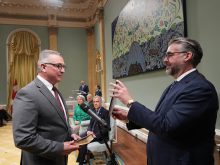Many farmers are cautiously hopeful for change after Mark Carney’s Liberals won a minority government last week.
Farm groups across the country have congratulated the new government on its election win while also pushing for immediate action on the most important agricultural issues.
Follow all our Federal Election 2025 coverage here
Read Also

Gene editing digs deeper space in Canadian plant breeding
More Canadian research into crop variety development is incorporating gene editing, and one researcher notes that Canada’s regulatory approach to gene editing will help drive innovation
While the election results may not reflect the political leanings of all producers, some say the new government can move quickly and provide meaningful change.
Grain Growers of Canada (GGC) executive cirector Kyle Larkin said he thinks some farmers are hopeful.
“I think there’s hope that that things will change, and that grain farmers and the policies that both support them and impact them are truly sought out by this new government,” he said.
Canadian Federation of Agriculture president Keith Currie said he thinks farmers are “cautiously optimistic” about a potential for change, despite farmers and rural ridings usually leaning Conservative.
“I don’t know if they actually think it will be different. They’re hoping it will be different,” Currie said.
“I’m a little apprehensive that things are going to change drastically. But to be fair, Mark Carney’s only been in for three days.”
GGC chair Tara Sawyer, a grain farmer from Acme, Alta., said she has her concerns, especially with the government being a minority, but saw room for hope as well.
“I’m a half-glass-full person,” she said.
“I’m hopeful. I mean, it is a minority Liberal government, but I’m hoping that, since it is a new leader in place, that maybe he’s going to listen more to the farmer and take into consideration some of our issues.”
The government’s actions in the coming weeks will be crucial for producers. Currie said the conversations between the prime minister and U.S. president Donald Trump could set the course.
“Depending on how those conversations go, that will certainly have some bearing on … some of the commodity markets.”
Similarly, he said the new government’s response to Chinese tariffs will be important for farmers.
Larkin said GGC is wasting no time advocating for changes.
“Obviously some … issues are going to take a longer time fixing, (like) the tariff issue in our international trading relationships.”
Others, like the capital gains and carbon tax reduction, he said he would like to see by Canada Day.
Currie said farmers can work with the government to be partners on some key issues.
“As far as all things environment and sustainability, we can help out there. When you talk about the social aspects, and more specifically, food security, that’s what we do. We grow cheap, high-quality food.”
Data suggests many farmers would have preferred a Conservative government; according to a recent set of reports from the University of Calgary, nearly 70 per cent of Canadian farmers said they thought the Conservative party best represented their interests. Larkin acknowledged this, but said farmers could still see their concerns represented in Parliament.
“There’s some things to note here,” he said.
“We’re in a minority Parliament where the Liberals are going to have to find votes from the other side of the aisle, and they’ll be able to find them either from the Conservatives, the Bloc or the NDP.”
“We’re hopeful that parties can collaborate and work together in Parliament to pass policies that really benefit not only the agricultural sector but also Canadians and the Canadian economy.”
There is still concern Carney’s government could fall into some of the same unpopular patterns as those of former prime minister Justin Trudeau’s Liberals. Sawyer said the new administration can set itself apart by showing that it is listening to farmers more than the last one did.
“In the West, there’s been that feeling. So, what this government needs to do is they need to start listening and showing that they see us, they value us and they’re going to work with us, for us.”
Currie wonders where the prime minister will go on environmental issues.
“His approach in the past, while he was not prime minister, was not too far off of where the former prime minister was.”
Currie, an Ontario cash crop and sweet corn farmer , said he hopes this election cycle, with its heavy emphasis on threats south of the border, leads fellow producers to “pay attention to all elections, not just from a personal standpoint and what’s affecting them, but what’s in the best interest of the country going forward.”
One of the most potentially endearing aspects of the new Liberal government to farmers is recently appointed agriculture minister Kody Blois.
Larkin, Sawyer and Currie all said they would like to see him return to the file.
“He really understands the issues that farmers are facing and really take seriously, how long-term viability for family farms is so important,” Larkin said.
Currie said Blois is “no stranger to agriculture” and is “respected among agriculture commodity organizations and farm groups.”
Sawyer said Blois’ previous decision to break from his party on the carbon tax shows his commitment to agriculture: “He not only understands the struggle of a farmers, but … he voted against his party on the one piece. He stood up for farmers and the people in his riding.”
Many agriculture groups across the provinces and commodities, including Alberta Grains, the Agricultural Producers Association of Saskatchewan, Grain Farmers of Ontario and Dairy Farmers of Canada, congratulated Mark Carney and the Liberal party on their victory while also encouraging productive changes for the agri-food sector.
















